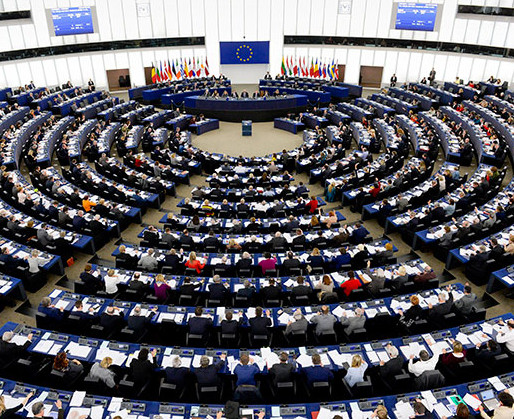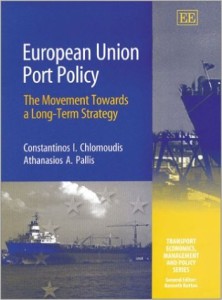The European Parliament adopted today a report on the Regulation establishing a framework for the organisation of port services and financial transparency of ports presented by the rapporteur MEP Knut Fleckenstein.
The port Regulation was approved the agreement reached in that respect with the Commission and Council last summer with 546 votes in favour, 140 against, 22 abstentions. This vote makes an end to the Port Package saga that started 15 years ago.
The proposal was originally put forward in 2013 but stalled due to the European Parliament elections in 2014 and then picked up again by the same rapporteur. It was the subject of intense discussions and long negotiations.
The Council is expected to give soon its green light to the ports regulation proposal and in this way the text will be adopted as EU law.
“This is a milestone in all respects….Thanks to some visionary port professionals and policy makers we now have a solid basis to improve the ports of the Union.”
PortEconomics reports the first reactions, to the agreement:
Isabelle Ryckbost, Secretary General, European Sea Ports Organisation (ESPO): “The vote today must be seen as a historical moment. We would like to congratulate the Parliament, the Commission and the Council for achieving this result after so many years of discussion. We are mostly grateful to the rapporteur and the shadow rapporteurs who have demonstrated a lot of understanding for the specificity of the port sector as reflected during the debate on Monday. Their work has made it possible to find a common ground for this legislative text. We can now finally turn this page and work on the many challenges European ports are facing today, in particular, the trade facilitation agenda, decarbonisation, investments in ports and their hinterland connections” –
Patrick Verhoeven, Secretary General, European Community Shipowners Association (ECSA): “ECSA has deplored throughout the discussions that this proposal does not address some of the market access problems in ports shipowners face. However, now that after 15 years of discussions we finally have a first EU law on ports, we should build on this and see it as a first step towards a genuine motorways of the sea in which ports are key points. Especially for short sea shipping operators, who make frequent port calls and for whom by consequence well performing port services are proportionally extremely important, we call upon the European Commission to take now further efforts to ensure this sector can deliver its potential. ”
Gunther Bonz, President, Federation of Private Port Operators (FEPORT): “The current depressed growth aggravates the impact of market inefficiencies and reveals the necessity to better target investments on hinterland connections to improve the connectivity of the transport network. Private port operators are ready to continue to invest but they need a clear and stable framework including fair and transparent governance rules and a real protection from risks of distortion of competition. We are confident that the [European] commission and member states will hear our call as it is a legitimate request that will benefit not only private port operators, but also the whole maritime logistics chain”.
Thanos Pallis, PortEconomics and Research Director of the Jean Monnet Program “European Port Policy” at the University of the Aegean: “This is a milestone in all respects. When recorded the progress of EU policy before the commencing of the Port Regulation 15-years saga, I never thought that it would take so long to agree. Studying the various phases – the EP narrowly turning down the first proposal in 2004, and by an extensive majority the second one in 2006 – it was evident that so many people wanted to defeat any proposal for so many reasons. Thanks to some visionary port professionals, and policy makers we now have a solid basis to improve the ports of the Union. The Regulation will clarify the scene and allow further positive initiatives to facilitate the competitiveness of EU ports”
Thanos is the co-author of the book European Ports Policy: Towards a long term strategy (Edward Elgar; 2002) . He now works with Patrick Verhoeven in preparing a new book discussing EPP in the 21st century.
Lamia Kerdjoudj Belkaid, Secretary General, FEPORT: “Ports Regulation voted in EP Plenary: Congrats to @knufleckenstein and his staff. Please the European Commission DG-MOVE keep consistency with GBER and Ports Regulation.
Terje Samuelson, ETF Dockers’ Section Chair: “Indeed, we would have preferred a more stringent text, notably on the protection of workers in case of change of operator and on the good repute of the operators. As we have already stated in the past, we appreciate the work done by Mr Fleckenstein and his team who managed to negotiate substantial improvements in a political context that is certainly not favourable to unions’ demands. It is crucial for us that the attack on the right to strike, which was very dear to the former Transport Commissioner, has been removed from the text. In line with what declared by Mr Fleckenstein during the Plenary meeting, we reiterate the importance of Article 14, which is the result of an agreement between ETF and FEPORT. The rapporteur was very clear on the reasons behind this article. We are determined to block any attempt to manipulate article 14 in order to take the liberalisation agenda further”
“European vision, confidence, trust, respect, perseverance: this is the way Europe works!“
Knut Fleckenstein, MEP. “Fifteen years after the first attempt to liberalise EU ports we have agreed on a text that does not liberalise ports and does not introduce self-handling. Even if it is not this regulation that will solve the social problems affecting EU ports, we have set the basis for future work. I have visited several ports in Europe, and in some of them I have witnessed subcontractors who don’t apply training standards and social legislation. I warn the Commission that liberalisation of training is not the right way to be taken”.
Violeta Bulc, Commissioner for Transport: “Ports provide jobs to 3 million Europeans and are the gateway of the EU internal market. A competitive port sector is therefore essential to Europe’s economy and trade. The Regulation adopted today will give European ports a boost by facilitating private investment, by encouraging a better use of public resources and more efficient port operations, while ensuring an adequate training of workers.”
Dimitrios Theologitis, Head of Unit “Ports & Inland Navigation”. European Commission – DG MOVE: “The European Parliament adopted today with a large majority (546-140-22) the port services regulation. The glass is more than half-full, the basic principles with which I set out five years ago are still there. Still room for interpretation, there certainly is more work to do. It was a long way, first green paper in 1997! I would like to thank all who contributed, EP, Council, stakeholders and — last but not least — my worthy colleagues. European vision, confidence, trust, respect, perseverance: this is the way Europe works!”
Eurosceptical reactions are also made available:
Jill Seymour, UKIP Transport Spokesman: “This proposal for market access to port services and financial transparency does nothing for ports in the United Kingdom. The UK is leaving the EU, and regulation like this is typical of the reasons why… ensuring British ports are excluded from the controversial Ports Services Regulation will be a key test of the Government’s Brexit negotiations.”














